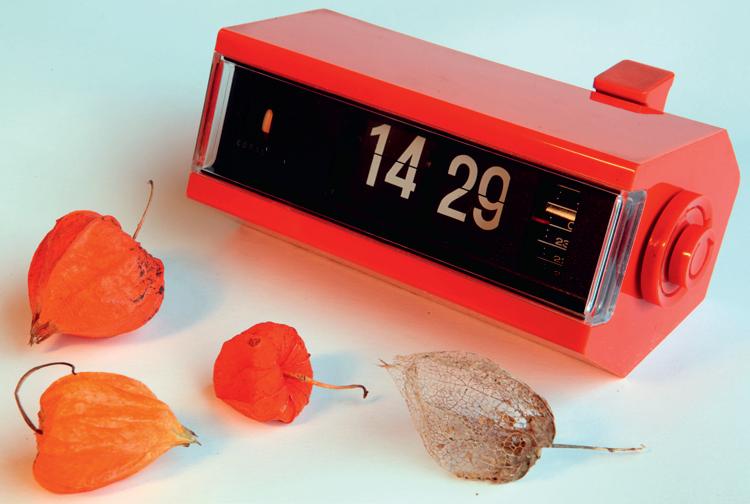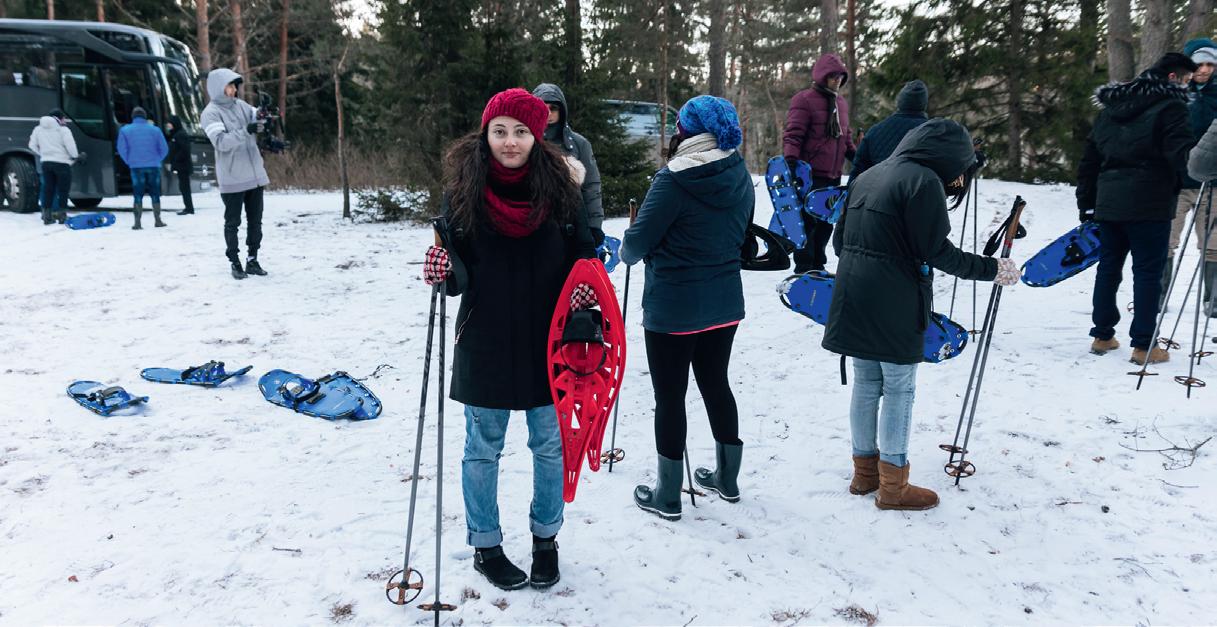
19 minute read
12. Everyday money matters
In Estonia you are expected to manage your financial affairs on your own. However, the first time you go to an office, in an institution or a bank, you may ask for the help of a friend or your support person, if available. You must find a suitable job rather fast, which enables you to have a better quality of life and pays enough for you to manage your monthly living expenses. The earlier you (and your spouse) go to work, the quicker you get a better understanding and more experience in Estonian work culture. Although all state taxes are usually already deducted from your salary, you must pay certain ongoing expenses every month which are related to your place of residence: rent and utilities. You will also need money for food, household items, clothing, leisure time activities, etc. Setting up your household will also require money. Your expenses may not be the same every month. Therefore: • plan your spending carefully; • save money for possible emergencies; • avoid debts; • pay bills on time. If you don’t, you may be charged interest on the unpaid amount and the service may be discontinued. Even then, you are still responsible for paying the due bills along with interest.
Most goods and services are taxed at 20%. There are some products – like books – that are taxed at the rate of 9%. This tax is already included in the price Excise duties are imposed on alcohol, tobacco products, fuel, electric energy and packaging.
Advertisement
12.1. PAYMENT OPTIONS
You can pay for products and services in the following ways:
Cash
• The currency in Estonia is EURO (€) • Coins are in units of 1-, 2-, 5-, 10-, 20- and 50-cents, 1- and 2-euros.
• Paper currency is in units of 5-, 10-, 20-, 50-, 100-, 200- and 500-euros
• 100 cents = 1 euro
Debit card
• If you have a bank account, you can pay in shops with your debit card
• You will have a PIN number which you need to memorize • You can also withdraw money from ATM • Estonian banks issue only Mastercard and not Visa cards – be aware of that if you plan to travel abroad as your card payment options may be limited in certain countries or areas.
Digital methods
• If you have a debit card and a smartphone, you can connect them and do NFC payments or use Apple or Google Pay
Bank transfer
• Mostly used for online-shopping and sending money to other people, but also paying bills, rent, utilities, purchasing bus or train tickets or tickets to cinema, theatre, concerts etc • You would need an internet bank account and digital ID. • We don't recommend to use internet bank on public computers.
You can open a bank account at a bank of your choice (Swedbank, SEB Bank, LHV, etc.).
Your monthly incomes will be deposited in this bank account.
Note that some banks might want to charge you a fee for opening an account. When choosing a bank, compare the lists of fees for services at different banks, and check to see what cash machines (ATM) are located near your home.
When you go to the bank to open an account, take your residence permit with you. Before signing a contract, make sure you understand all the conditions. If you need additional explanations, ask for them, or ask to see the contract in a language that you understand better (Estonian, Russian, or English).
12.3. CASH MACHINES (ATM)
Cash machines (ATM) offer various services. Make sure you understand what transactions are possible at each ATM machine, particularly the one you plan to use most frequently. If you need cash, you can withdraw it from the ATM of the bank you have an account in. It is possible to do it from other banks’ ATMs too, but you might be charged for that.
When withdrawing cash from an ATM pay attention to insert the correct PIN number. If you insert the wrong PIN code 3 times in a row (even during different days), the machine will confiscate your card and you will need to apply for a new card.
12.4. FINANCIAL RISKS
A bank may also offer you opportunities for loans or a credit card.
Remember that every debt is a financial responsibility. Return payments of the loan must be regular; if not, the bank will charge you fees which will further increase your financial burden. If you do not have a stable and sufficient income, avoid credit cards and loans. Try to get by on the amount of money you have available.
In addition to the basic amount of the loan, you will have to pay interest. The total amount you have to pay back can be up to 25% more than the amount borrowed.
Besides banks, small loans are offered by instant loan (kiirlaen, sms-laen etc) agencies. These agencies transfer money to your account quickly and without a contract fee, but their interest rates are very high. For this reason,
people who use these services often fall into debt and the amount they
have to pay back doubles or becomes even larger.
Spend your money wisely and do not ask for a loan or a lease if you don’t have financial means to cover the expenses. When making a new purchase think if you really need it and if you can afford it (for instance a very expensive phone). Be aware that paying back loans and leases is an obligation. If you don’t pay back, the debt collectors can come, and you can be taken to the court.
In Estonia you will find shops in small towns and large cities. There are shops that specialize in certain kinds of products, such as groceries, consumer goods, cosmetics, electronics, books, and clothing. Usually, you can find all these shops in a shopping mall. The majority of large supermarkets are opened from 8 or 9 to 22 or 23. Very few ones are open 24/7. Stores – other than food store – are usually open on workdays from 10 to 20 or 21, might close earlier on weekends. On national holidays, the food stores are open shorter time and other stores are usually closed. In Estonia clothing and consumer products are relatively expensive. It’s good to plan purchases to sales, be more aware of prices in different shops, order online or need be visit second-hand clothing stores.
You can also ask friends and acquaintances for suggestions on finding secondhand shops in your area. Uuskasutuskeskus and Humana are the most known ones that have stores all over Estonia. Also look out for shops that have very good prices like Realiseerimiskeskus, Magaziin, Maxima and so on.
In most Estonian towns, you can find markets that offer many different products from seasonal fruits, vegetables and berries to fish, meat, clothes and items for home. Keep in mind that the range of products and their prices depend mostly on the season. Always be on the lookout for discounts. If the expiry date allows, buy basic ingredients in larger packages, because the price per kilo is lower than for a smaller package. Instead of going to the store, you can also use online store and order all necessary products to your home. This way you will save money as the temptation to add things to your cart on impulse is smaller. The prices for products may vary in different shops and in different regions of Estonia.
You should consider obtaining different stores loyalty cards in order to receive discounts every time there are some campaigns available. Just keep in mind that they will collect your personal data.
12.6. HOW TO SAVE MONEY
There is no magic formula for saving money – you simply need to be sensible and critical on how you use your money. Few tips you could use:
• Keep an eye on special offers in shops and buy more when there are discounts. (check the expiring dates.) • Buy consumer goods and clothes during sales. • You can also buy clothes from second-hand shops. • Order as many services as possible from the same provider and ask about special offers. For example, you can get internet and mobile phone services from the same provider and choose the one offering the best price. • Never buy anything before checking the prices of other service providers – make sure that you get similar value for money. • Use Skype or WhatsApp to talk or chat with your family and friends for free. • Make sure you have turned off all the lights and taps before you leave home. • Do not leave water running when you are not using it. • Walk, cycle or use public transport if possible. • Try sharing a flat with friends or other people. • Cook at home and enough for more than one meal (you can freeze some foods and food products so they would not go waste). • Prepare a monthly budget and keep track of what you are spending most of your money on. Think about whether you need everything you have bought or whether you are just buying things because you like them. • Instead of buying books and films, borrow them from a library. You will need to register with a library in order to do so.
i
Kui palju see maksab? How much does it cost? Raha Money Sularaha Cash Münt Coin Pangakaart Bank card Sularahaautomaat ATM Internetimakse Internet payment Ülekanne Bank transfer Sissetulek Income Väljaminekud Expenses
The Estonians are strongly influenced by everything described in this guide. Some things have influenced them more than others, but they have all left their mark on society and the way it functions today.
Sometimes people moving to Estonia from abroad may find Estonians “cold” at first. This does not mean that the people don’t like you. They simply need time to get to know you. Understanding the main rules of communication and conduct will make getting around with Estonian people easier.
Speaking the local language, knowing the norms and values in the society helps to communicate better with locals and adapt faster in the Estonian society.
13.1. COMMUNICATION AND CONDUCT
Like all other cultures, Estonians have habits and traditions that concern everyday communication and conduct.
Greetings and distance
• When meeting on the street, people usually greet each other with a wave of the hand (without physical contact). • A handshake is used in more formal settings (regardless of whether the other person is a man or a woman). • Physical contact (e.g. a hug) is common among young people and in informal communication.
• Kissing on the cheek is not common in Estonia.
Estonians like to keep some space around them and invading this space may make people feel uncomfortable, and they may take a step back to maintain their personal space.
Estonians value their privacy, avoid asking personal questions if you are meeting for the first time.
Eye contact
• Estonians consider eye contact very important in communication, as it shows that you are interested in the other person and that they have your attention.
• If you avoid eye contact, people may think you have something to hide or that you are bored or not interested in the conversation. • Always make eye contact, but ensure it is not too intense, or it may be interpreted as overbearing.
Conversation habits
• It is important to be specific in conversations. Taking a long time to get to the point is considered a waste of time. • Estonians do not generally talk with their hands. • People are rather informal when they communicate with their colleagues, calling them by their first name irrespective of their age or position. • When addressing an official or service staff, it is advisable to use the formal “teie”, which is also appropriate and polite when speaking to older people or meeting someone for the first time. • However, using the less formal “sina” is not disrespectful.
Refusal
Estonians are usually direct and say what they think, which is why they are also direct in refusal and say ‘no’ immediately if they feel they cannot do you a favour.
‘No’ usually means ‘no’, and there is little point trying to make people change their mind – they see it as applying pressure, which may have negative consequences. This means that you too should be direct. It takes some getting used to but is not impossible.
If you are invited to join an event and you already know you won’t be able to attend, you should say straight away that you can’t attend. Promising and then cancelling in the last minute is considered very impolite, while saying the truth would be appreciated as this would avoid cancelling in the last moment.
Visiting
• Home is important to Estonians, which means that people do not often invite guests over, unless you are a family member or a close friend. • Visiting someone without asking or telling them in advance is generally considered impolite. • It is polite to bring something for the host when you visit them. • Both men and women who are mutual friends may invite each other over. • Guests do not generally help themselves to food or drinks until the host offers.
• If someone has invited you over and you want to bring a friend, make sure you ask beforehand whether this is OK.
Gifts
• Estonians celebrate birthdays, anniversaries, marriage, graduation and often also when people move into a new home. • If you have been invited to a party, take a gift for the host (unless it says on the invitation that you do not need to bring one). • The gift should be something small – flowers, chocolates, wine, etc.
• You should not give gifts or agree to give to officials or other service providers (e.g. doctors) as expressions of gratitude – this could be deemed bribery and be subject to punishment.
Taking responsibility
• Taking responsibility for your actions is important in Estonian society. • You make your own decisions, so you are responsible for the consequences. • Parents are responsible for the actions of their children until they turn 18 – but after this they must take responsibility for their own actions. • Society expects you to be independent and show initiative. • Expecting too much and being dependent on the state and other service providers is not a long-term solution but restricts your independence and your ability to cope. • Being a good member of society means that you abide by the law, follow standards of conducts, earn your own money, pay taxes and contribute to society in other ways.
Time
Time is very important to Estonians, being late is considered impolite.
In general:
• Estonians are punctual and disapprove of being late; • if you have agreed to attend a job interview, made an appointment with a doctor, any other agency or need to attend a meeting with people you do not know very well, make sure you arrive on time or even early; and • if you cannot avoid being late and you know you will be in advance, make sure you call and let the other person or people know.

If you are late for meetings you may not be accepted and not receive the services which you requested.
13.2. RELIGION
In many societies, religion has a very important role. In Estonia, less than a third of the population define themselves as believers. The largest religious groups are Lutheran and Eastern Orthodox. There are also a number of smaller Protestant, Catholic, Jewish, Muslim and Buddhist groups. Although the number of believers is low, there is a freedom of religion in Estonia and everyone is able to follow their own practices. When communicating with Estonians, it is good to know that the majority of population is non-religious, but religion as such is not a taboo.
13.3. LEISURE ACTIVITIES
Free time is important to Estonians. Newspapers and local papers have details about events taking place. Local events can be also advertised on the website or social media channels of your town or municipality.

In your free time, you can go to the theatre or the cinema. In Estonia, the films are not dubbed (unless cartoons for children) and have the original soundtrack with subtitles in Estonian and Russian. Also, some theatre plays might have the subtitles in English and Russian. The theatres are available in bigger towns, and tickets should be bought in advance. Estonians value going to theatre and thus tickets are often sold out.
Events
You can find events of your interest on www.kuhuminna.ee or check the webpage/facebook page of your local municipality. Some municipalities have gathered under section “kultuuriaken”. You can try to browse from the internet.
Outdoors
In Estonia people value the time spent outdoors. Look out for nature tracks near you or via www.loodusegakoos.ee. Don’t forget to dress according to the climate.
13.4. LIBRARY
Libraries can also serve as a good place for free time. If you have a library card, you are able to borrow the books, DVDs and music CDs from the library. Additionally, most of the libraries have free internet access, but in smaller libraries, it might be with limited time of usage (because of other users) or with booking the time. Also, libraries are often hosting interesting events, which might not always require the reader’s card. In order to obtain the reader’s card, you would in most cases need to submit your ID to the library.

Estonians overall like to follow what is happening in the country and the world. Following local news gives you better understanding what is happening, but also more subjects to talk about. The three most popular Estonian websites for reading the local news are ERR, Delfi and Postimees. ERR news page is funded by the state and it provides news in Estonian, English and Russian languages. To read ERR news, go to err.ee, news.err.ee or rus.err.ee. On the page of ERR, you can also access the Estonian national TV.
Delfi and Postimees are privately-owned. Delfi can be read in Estonian (delfi.ee) or Russian (rus.delfi.ee). Postimees is available in Estonian (postimees.ee), in English (news.postimees.ee) and in Russian (rus.postimees.ee). For online news you can also use the web-based translators as outlined in chapter 2.
USEFUL VOCABULARY
i
Vestlus Conversation
Külastamine
Visiting Kingitus Gift Vabandust, ma jään hiljaks. Sorry, I will be late. Söök Food Religioon/ Usk Religion Vabaajategevus Leisure activities Hobi Hobby Teater Theatre Kino Cinema Raamatukogu Library
Living in an unfamiliar country is not always easy. Life in Estonia may be quite a challenge, not just because of the weather, but due to the significant differences in culture and values.
Adapting is easier for those who have encountered European cultures before, but people usually have a limited understanding of what lies ahead. At first, you may be interested in the new culture and find it exciting, but soon realize that your new situation is not living up to your expectations. This usually evokes a range of emotions, including depression and reluctance, because your knowledge of the new culture is inadequate, and you cannot understand the way people behave. This phase is known as ‘culture shock’ and is experienced to various degrees by most people who need to adapt to a new culture, even if you think you know the culture. It is highly likely that you will experience some element of culture shock, but don’t worry, below we list some tips on how to cope with it.
14.1. HOW TO COPE WITH CULTURE SHOCK
• Learn about local rules and traditions and do your best to find friends and acquaintances. • Be an active member of society – find something to do, e.g. a hobby. • Find local friends (e.g. visit the local library, culture events, language cafes etc.). • Try to find a job as quickly as possible if you have the right to work. • Attend the Estonian language courses. • If you have children who go to day care or school, try to attend events involving parents and mingle with other parents. • Try voluntary work/service – it is an excellent opportunity to understand
Estonians and their work culture, and it is ‘added value’ on your CV.
Remember that culture shock does not last forever, and you will start to feel comfortable in both your old and new cultures if you work on it. You do not need to abandon your ethnic or cultural identity – you will simply be acquiring an additional one. See also chapter 8.10 for some tips on how you can make yourself feel better.
i
Kultuurišokk Cultural shock Kultuurierinevus Cultural difference Kohanemine Adaptation Toetus Support Abi Help Intergratsioon Integration
NOTES
15. SUMMARY OF SERVICES AND SUPPORT AVAILABLE.
What
Information, advice and guidelines on living in Estonia • Support person (for first few months in
Estonia) • Eesti Pagulasabi • Social worker at the municipality • Welcoming program • Information and counselling centers • Integratsiooni
Sihtasutus
Get involved in local culture clubs and sport clubs
Information regarding your residence permit
Extend temporary residence permit, apply for long-term residence permit and citizenship • Estonian Police and Border Guard Board
Service provider Contact
• International House
Tartu • Estonishing Life • Eesti Pagulasabi • Asylum counsellors • Migration advisors of Police and Border
Guard Board
www.pagulasabi.ee info@pagulasabi.ee www.settleinestonia.ee www.integratsioon.ee info@integratsiooniinfo.ee
asylum.counsel@counsel.ee www.politsei.ee/ konsultanty-po-migracii migrationadvice@politsei.ee Skype: EstonianPolice_ MigrationAdvice www.politsei.ee info@politsei.ee 612 3000
What Service provider Contact
Free legal aid • Daily legal matters (e.g. household contracts, work contracts, loans/ debts etc) • Eesti Õigusbüroo OÜ • Residence permit matters • MTÜ Inimõiguste
Keskus • Work related matters • Sotsiaalkindlustusamet • Tööinspektsioon • Equal treatment matters • Gender and Equality and Equal Treatment
Commissioner • Õiguskantsler
www.juristaitab.ee abi@juristaitab.ee 6 880 400
www.humanrights.ee info@humanrights.ee 644 5148
www.sotsiaalkindlustusamet. ee
660 7320
www.ti.ee/en 640 6000
www.vordoigusvolinik.ee info@svv.ee 626 9059 или 5620 9906
www.oiguskantsler.ee info@oiguskantsler.ee 693 8404
Estonian language • Foundation Tartu Folk High School (Rahvaülikool) A1-B2 level • Eesti Töötukassa • Eesti keele maja/ Integratsiooni sihtasutus • Estonian language cafes
www.rahvaylikool.ee
www.tootukassa.ee
15 501
www.meis.ee
Help with finding a job • Eesti Töötukassa www.tootukassa.ee
15 501
Education
• Educational institution Contact the local municipality or school or kindergarten in order enroll yourself or your child.
What Service provider Contact
Monetary support • Subsistence benefit, emergency social assistance • Local municipality • Unemployment benefit, unemployment insurance benefit • Eesti Töötukassa • Birth allowance, child allowance, childcare allowance, state pension • Sotsiaalkindlustusamet
Medical help
• Family doctor /primary reference point in case of health concerns) • Specialist doctors (orthopedist, gynecologist, etc.) Psychological support • Family doctor • Psychologist
Support if you have experienced domestic violence • Police • Psychologist
Contact the local municipality
www.tootukassa.ee
15 501
www.sotsiaalkindlustusamet. ee
info@sotsiaalkindlustusamet. ee
612 1360
Contact your family doctor or register for an appointment with a specialist doctor www.terviseamet.ee
Contact your family doctor or register for an appointment with a psychologist. Phone: 112
Register for an appointment with a psychologist







